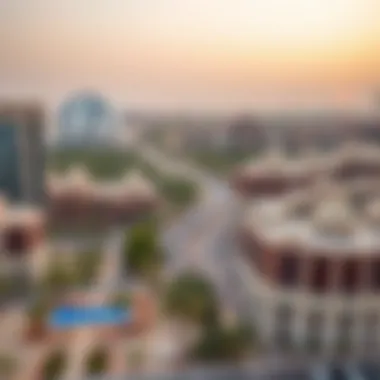Exploring Jebel Ali: An In-Depth Overview


Intro
Jebel Ali stands as a noteworthy location within the vibrant city of Dubai. Its strategic position has positioned it as an economic powerhouse, well-known not just in the UAE, but globally. The area is more than a mere dot on the map; it is a dynamo of activity, bringing together commerce, transport, and real estate vibrancy in a unique blend.
This section will offer insights into the property market, unravel current trends, and provide vital information for anyone considering involvement in this bustling area. Jebel Ali’s property market is also rife with opportunities, owing much to its strong infrastructure and connectivity, making it attractive for both investors and homeowners.
As we explore the numerous facets of Jebel Ali—from its bustling economic environment to housing dynamics—this overview aims to arm potential investors, buyers, and industry professionals with the information they need to make informed decisions.
Property Market Overview
The property market in Jebel Ali presents an intriguing landscape, characterized by a mix of residential, commercial, and industrial opportunities. Understanding the nuances of the market is crucial for anyone contemplating entry.
Current Market Trends
In recent years, Jebel Ali has seen a steady uptick in property values. This surge can be attributed to a variety of factors. The proximity to the Jebel Ali Port, one of the largest ports in the Middle East, has been a key driver. Moreover, Dubai's ongoing development projects continue to bolster the attractiveness of the area.
- Increasing demand for residential properties: Many expatriates and locals alike are seeking housing that balances affordability with quality.
- Commercial spaces are becoming increasingly sought after: As businesses find a foothold in Jebel Ali, the appetite for office and retail spaces is on the rise, showing positive growth trajectories.
- Sustainability initiatives: Many new developments focus on environmentally friendly designs, reflecting a global trend toward sustainability.
The property market in Jebel Ali is not just about buying; it's about seizing a unique opportunity in a thriving sector.
Key Neighborhood Insights
Jebel Ali comprises a variety of neighborhoods, each offering unique attributes.
- Dubai Investments Park: This area is pivotal for investors as it combines residential and commercial spaces. It is also designed to cater to both small and large businesses.
- Al Maktoum International Airport area: Home to future developments, this area is seen as the next big thing, creating buzz and interest among developers and landowners.
- Jebel Ali Village: Focusing on family-friendly environments, this neighborhood offers various amenities and good schools, making it attractive for families looking to settle.
As the property market matures, these neighborhoods are becoming hotspots regardless of the type of investment one chooses to explore.
Buying and Selling Guidelines
For those considering buying or selling property in Jebel Ali, a sound understanding of the market is essential.
Essential Steps for Buyers
- Research: Delve into the specifics of neighborhoods and property types.
- Legal Consultations: Understanding local laws and regulations is crucial to avoid pitfalls.
- Financial Planning: Having a budget and securing financing in advance can streamline the buying process.
It is vital to consider the future value of a property, given the ongoing developments in the area.
Tips for Sellers
- Property Valuation: Getting a professional appraisal helps set realistic expectations on pricing.
- Enhancements: Minor repairs and aesthetic improvements can significantly increase property value.
- Market Presentation: Effective marketing strategies significantly enhance visibility in a crowded market.
By adhering to these guidelines, sellers and buyers alike can navigate the Jebel Ali real estate market more effectively, finding unique opportunities that align with their investment goals.
Preamble to Jebel Ali
Understanding Jebel Ali is essential for grasping the wider economic and geographic context of Dubai. This area is not just a mere pin on the map; it is an economic powerhouse, serving as a gateway for trade and commerce. The unique characteristics of Jebel Ali, from its strategic location to its bustling port, make it a fascinating subject that captures the interest of investors, developers, and businesses alike. By delving into its historical roots and geographical relevance, one can appreciate how these elements shape the future of this dynamic area.
Historical Background
The history of Jebel Ali dates back to the late 20th century when it was established primarily as a port. Initially, it was a small coastal settlement, but over the years, it transformed into a significant industrial hub. The creation of the Jebel Ali Port in 1979 marked a pivotal turning point; it became a major maritime facility not just for Dubai but for the entire region. The port's development spurred rapid economic growth in the area, leading to an influx of international businesses.
Moreover, the area was also strategically chosen due to its proximity to the Dubai International Airport, which has played a crucial role in facilitating trade and enhancing connectivity. This evolution reflects the foresight of visionary leaders, who recognized the potential of transforming a simple harbor into a global logistics and manufacturing center.
Geographical Significance


Jebel Ali is strategically located on the southwestern coast of Dubai, sitting along the Arabian Gulf. This advantageous position is more than just geographic; it is a crucial link in the global trade network. The port itself is one of the largest in the world, providing access to many shipping routes. Thus, companies operating here benefit significantly from reduced shipping times and costs.
The area is well-connected by a robust network of roadways, allowing for effortless distribution and connectivity to other Emirates and neighboring countries. This connectivity makes Jebel Ali not just important locally but also a significant player in the regional economy.
With ongoing infrastructure projects like the expansion of the Dubai Metro and enhancements to the road networks, Jebel Ali is poised for continued growth and relevance in the years to come. Ultimately, its geographical location is a vital asset for any business looking to tap into both local and international markets.
"Jebel Ali is more than just a location; it’s a strategic advantage for businesses aiming for global reach."
Economic Overview
The economic landscape of Jebel Ali offers a fascinating look into how a strategically positioned area can transform into a bustling hub of activity. Jebel Ali, primarily known for its port, plays an essential role in not only Dubai's economy but also in the global market. With its unique offerings and significant potential, understanding the economic overview is crucial for investors and other stakeholders. This section highlights the key points that underscore Jebel Ali's economic relevance and its role in various industries.
Key Industries
Within Jebel Ali, a diverse range of industries flourishes. The key sectors contributing to its economic vibrancy include:
- Logistics and Warehousing: With Jebel Ali Port at its heart, logistics is undeniably a cornerstone of this area's economy. The port's infrastructure ensures swift and efficient movement of goods, making it a preferred choice for international shipping.
- Manufacturing: Numerous manufacturing plants, particularly in sectors like petrochemicals and food processing, are strategically located in Jebel Ali. They benefit from proximity to critical raw materials and export routes.
- Tourism and Hospitality: As Dubai continues to attract millions of tourists, the hospitality industry around Jebel Ali is booming. Luxurious hotels and leisure facilities are emerging, catering to visitors drawn by the strategic location.
- Energy Sector: The presence of oil reserves and a well-developed energy infrastructure positions Jebel Ali as a significant player in the Gulf's energy market. This sector not only supports local needs but also feeds into global markets.
The diverse industrial landscape of Jebel Ali is crucial, as it allows for resilience against economic fluctuations, enabling a robust employment market and steady revenue flows for investors.
Trade and Commerce
Trade and commerce are the lifeblood of Jebel Ali's economy. The area benefits immensely from established trade agreements and its strategic location as a gateway between East and West, making it a linchpin of international trade. Key aspects include:
- Free Trade Zone: Jebel Ali Free Zone (JAFZA) attracts foreign investment with its tax incentives and 100% foreign ownership privileges. This zone facilitates easy importation and exportation of goods, drawing companies from across the globe.
- Market Reach: With access to over 2 billion consumers, companies operating in Jebel Ali can easily tap into expansive markets across the Middle East, Africa, and South Asia. This market accessibility is significant, considering that trade has increased substantially over the last decade.
- Infrastructure Support: The region's infrastructure supports trade efficiency, including state-of-the-art logistics facilities, state-of-the-art technology, and streamlined customs processes, all of which minimize operational delays.
It’s clear that Jebel Ali is not merely a local player but a significant contributor to the global supply chain. As businesses continue to flock to the region, the economic overview presents compelling opportunities for investors looking to capitalize on Jebel Ali's dynamic growth.
"In Jebel Ali, the mixed tides of industry create a strong economic flow."
Understanding these economic dynamics is essential for anyone looking to invest or participate in Jebel Ali's future, which promises significant returns and strategic advantages.
For more related information on Jebel Ali's economic landscape, consider visiting resources like Wikipedia, Britannica, or Census.gov.
Jebel Ali Port
Jebel Ali Port is more than just a harbor; it is a linchpin in the global trade network and a beacon of economic activity in the UAE. The port carries with it a vital role in shaping not only the local economy of Jebel Ali but also influencing international shipping routes and trade dynamics. Historically, it has catered to a multitude of industries, enhancing the region's reputation as a commercial hub.
Importance in Global Trade
The significance of Jebel Ali Port in global trade cannot be overstated. This bustling port stands as one of the largest and most advanced in the world, instrumental in connecting Asia, Europe, and Africa. With its strategic positioning, goods can move seamlessly in and out of Dubai, making it incredibly popular among international businesses.
- Trade Volume: Handling over 15 million TEUs (Twenty-foot Equivalent Units) annually, this port reflects vast trade volumes. The sheer scale of operations supports diverse industries from textiles to electronics.
- Gateway to the Middle East: As a critical point for shipping into the Middle East, Jebel Ali Port serves as a gateway, providing unrivaled access to surrounding economies.
- Regulatory Benefits: Being part of a Free Trade Zone, companies operating here enjoy tax exemptions and streamlined customs processes, thus reducing overhead costs significantly.
In essence, Jebel Ali Port acts as the backbone of Dubai's trade ecosystem, driving economic growth and attracting global investors.
Port Facilities and Capacity
Equipped with state-of-the-art facilities, Jebel Ali Port is designed to handle a large influx of shipping traffic and cargo. Its infrastructure caters to modern logistic needs, which is paramount for businesses seeking efficiency in their operations.
- Advanced Technology: The port employs cutting-edge technology such as Automated Guided Vehicles (AGVs) and a sophisticated container terminal system, streamlining the loading and unloading processes. This technology ensures quicker turnaround times for vessels.
- Capacity Expansion: Plans for future expansions highlight the port's commitment to keeping pace with global shipping trends. Recent developments aim to increase capacity by adding new berths and upgrading existing ones, boosting competitiveness
- Multimodal Connections: Jebel Ali isn’t just a port; it integrates road, rail, and air transport, providing a smooth transition for goods. For example, the access to the Dubai Metro and nearby highways enables easy distribution to various markets.
In summary, the facilities at Jebel Ali Port play a crucial role in maintaining its position as a premier global port. By continually innovating and expanding, it enhances not only its capacity but also its service quality, ensuring it remains a preferred choice for shipping and logistics companies worldwide.
"Jebel Ali Port is not just a facility; it's where commerce meets innovation, paving the way for future economic prosperity."


Transportation Infrastructure
Transportation infrastructure in Jebel Ali serves as the lifeblood of its dynamic growth. Given its strategic positioning near the coast and its proximity to Dubai, an efficient transport system underpins trade, commerce, and the movement of people. A well-connected area not only boosts economic development but also ensures that local residents can easily access essential services and amenities. In essence, this connectivity is crucial for potential investors and property buyers seeking opportunities in this vibrant region.
Road Connectivity
Jebel Ali boasts a robust road network that seamlessly integrates it with major highways leading to Dubai and beyond. Key routes, such as Sheikh Zayed Road and the Abu Dhabi-Dubai Road, facilitate the smooth movement of goods and personnel. The presence of multiple exit points reduces traffic congestion, making it a prime location for businesses looking to minimize logistical costs.
The area also features well-maintained roads that cater to both light and heavy vehicles. This is especially significant for transport companies and manufacturers who rely on road logistics. With easy access to the Jebel Ali Free Zone, businesses benefit from the rapid distribution of products within the UAE and neighboring countries.
Moreover, ongoing improvements aim to further enhance road conditions and expand capacity to manage increasing traffic demands. Notably, projects like the upgrade of interchanges and the introduction of smart traffic management systems are already in the pipeline. This proactive approach showcases the commitment to maintaining Jebel Ali as a competitive player in the global supply chain.
"Strong road connectivity is crucial in supporting the economic and residential growth in Jebel Ali, attracting both local and international investors."
Public Transport Options
While road connectivity is critical, public transport services in Jebel Ali are increasingly becoming a focal point for enhancing accessibility. Dubai’s Department of Transport has made significant strides in developing efficient public transport options that align with the area’s growth trajectory. The upcoming Jebel Ali Metro Station, part of the Dubai Metro expansion, will link the region to the broader metro network. This will provide an eco-friendly alternative for commuting to key destinations within the city.
Local bus services also complement the existing transport landscape, with routes connecting residential areas to commercial hotspots. The integration of these public transport options not only eases congestion but also shaves time off daily commutes, a boon for both residents and employees working in the area.
As more people flock to Jebel Ali, these public transport improvements signal a shift towards a more connected future. Investors and property buyers should take note of such developments, as they often enhance the attractiveness of residential and commercial properties. As a result, the interplay between road and public transport options may contribute positively to property values, making Jebel Ali an even more enticing proposition for investment.
Real Estate Landscape
The real estate landscape of Jebel Ali is an integral aspect of its overall appeal, offering not just living spaces, but also a wealth of opportunities for investment and commercial ventures. With its strategic location adjacent to the bustling Jebel Ali Port and the industrial zones, this area holds a pivotal role in catering to the demands of residents and businesses alike.
Residential Developments
Residential developments in Jebel Ali reflect the area's rapid growth and transformation. The community is characterized by a mix of apartments, villas, and townhouses. Modern design blends seamlessly with functionality, catering to a diverse demographic from families to young professionals. Notable projects such as the Al Furjan community have attracted attention due to their family-friendly amenities and proximity to key facilities like schools and hospitals.
Investors will find that the residential market here benefits from a strong demand, particularly from expatriates who seek quality living environments. This trend is further supported by favorable rental yields, often surpassing other areas in Dubai. Moreover, with ongoing developments and government initiatives to encourage foreign investment, the future of residential real estate in Jebel Ali appears very promising.
Commercial Property Trends
The commercial property landscape in Jebel Ali is equally dynamic. The area has witnessed a surge in demand for office spaces, thanks to the strategic advantages offered by Jebel Ali Port and the free zone. Businesses looking to tap into the logistics and manufacturing sectors find Jebel Ali a compelling choice.
Recently, we see trends leaning towards flexible office spaces, reflecting a global move towards adaptable work environments. Co-working spaces are emerging alongside more traditional office setups, creating a varied and competitive market. Major developers are responding to this trend by launching innovations that integrate technological advancements into office designs.
Investment Opportunities
Jebel Ali's real estate market presents a cornucopia of investment opportunities. Investors keen on diversifying their portfolios find Jebel Ali an attractive proposition, especially given its infrastructure development and strategic initiatives promoting economic growth. With projects like the Dubai South, an ambitious urban development scheme that encompasses residential, commercial, and logistics spaces, the area is positioned for significant appreciation.
Some enticing aspects for investors include:
- Tax incentives – The UAE's tax-friendly policies make it a magnet for investors.
- Strong rental market – Continuous demand for both residential and commercial properties ensures consistent rental income.
- Infrastructure improvements – Ongoing enhancements in connectivity and public services further boost property values.
The potential for capital growth, coupled with favorable market conditions, makes Jebel Ali a hotspot for savvy investors. As global dynamics shift post-pandemic, Jebel Ali's adaptability and forward-thinking approach to real estate ensure it remains a coveted location for years to come.
"Jebel Ali offers a unique blend of strategic positioning and progressive development, making it a prime target for serious investors looking for bargaining opportunities."
For more detailed insights, check out resources like Wikipedia on Dubai Real Estate and Britannica's overview on Urban Development in UAE.
Environmental Considerations
Understanding the environmental considerations surrounding Jebel Ali is critical to grasping its long-term viability and appeal, especially for potential investors and stakeholders. The area’s rapid development poses both opportunities and challenges that must be addressed to ensure a sustainable future. In this section, we will unpack key sustainability initiatives and their impacts on the local ecosystem.


Sustainability Initiatives
Jebel Ali is not just a hub for economic transactions; it has also been a focal point for sustainability efforts. Over the past decade, various initiatives have been introduced to mitigate the environmental footprint of industrial and commercial activities. These initiatives encompass a broad scope of practices aimed at enhancing energy efficiency, reducing waste, and promoting renewable energy use.
For instance, the Jebel Ali Free Zone Authority has implemented strict regulations requiring companies to adhere to environmentally friendly practices. Many businesses in the zone have adopted solar energy solutions as part of their power strategy, which reduces reliance on fossil fuels. This is important because, as the demand for energy grows, the shift towards more sustainable sources becomes indispensable.
Moreover, recycling programs and waste management strategies are becoming increasingly common in the region. Companies are encouraged to minimize waste generation and recycle materials wherever possible. The outcome is not just better compliance with environmental regulations, but also an image of responsibility and innovation that appeals to eco-conscious partners and consumers.
"Sustainability is not just an afterthought; it's a fundamental part of our growth strategy in Jebel Ali."
This quote from a local business leader encapsulates the growing recognition that sustainability must be woven into the very fabric of business operations. Investors looking at Jebel Ali are increasingly considering companies’ commitments to sustainable practices when making decisions.
Impact on Local Ecosystem
The impact of development in Jebel Ali on the local ecosystem cannot be overlooked. While economic gains are vital, it is equally important to understand and mitigate any adverse effects on biodiversity and natural habitats. The region is home to unique flora and fauna that could be threatened by urban expansion and industrial activities.
Initiatives aimed at conserving local ecosystems are being pursued alongside development. Protecting the mangroves, for instance, is one such area of focus. These natural barriers not only support wildlife but also serve as vital defense mechanisms against coastal erosion. As urban planners and developers work toward future projects, integrating eco-friendly designs and restoring damaged habitats has gained traction.
In addition, ongoing research and monitoring of the local ecosystem aid in identifying potential issues before they escalate into more significant problems. By understanding the delicate balance of the area’s biodiversity, stakeholders can better navigate the complexities of development without compromising the environment.
All in all, environmental considerations play a pivotal role in shaping Jebel Ali’s development landscape. It is imperative for investors, buyers, and developers to remain informed and proactive regarding these issues. Incorporating sustainable practices not only helps protect the environment but enhances the attractiveness of Jebel Ali as a destination for investment.
Future Developments
As Jebel Ali continues to cement its status as a pivotal hub in the Middle East, the topic of future developments gains paramount significance. The evolving landscape is not just about physical structures; it's a reflection of economic aspirations, community wellbeing, and adaptability to shifting market demands. Investors and stakeholders eye these developments closely, as they carry potential for substantial return on investment and align with broader regional trends.
Upcoming Projects
A number of upcoming projects are on the horizon, each promising to transform the fabric of Jebel Ali while enhancing its offerings. Investment in infrastructure continues to ramp up, aligning with Dubai's ambitious vision for expansion. Key projects include:
- Jebel Ali Airport Expansion: Once completed, it promises to become a major logistics and passenger transit hub, enhancing connectivity and trade.
- Dubai South Residential Complex: Expected to host thousands of new residents, integrating residential areas with green spaces and modern amenities.
- Jebel Ali Free Zone Enhancements: Upgrades to facilities that cater to logistics and light manufacturing are set to boost economic activity.
- Educational Institutions: Establishing institutions with international standards will attract families looking for quality education, thereby driving demand for real estate products.
Each of these projects not only brings immediate economic benefits but also aims to establish a sustainable, well-rounded community that appeals to residents and investors alike.
Strategic Vision for Growth
The strategic vision for Jebel Ali’s growth underscores a deliberate approach to urban planning and economic development. It encapsulates ambitious goals that focus on:
- Sustainable Development: Emphasis on eco-friendly practices ensures that growth will not come at the expense of environmental integrity. Incorporating renewable energy solutions and green building practices stands at the core of this vision.
- Business Diversification: By attracting a range of industries, from technology to tourism, Jebel Ali aims to position itself as a versatile economic engine. This pushes against any singular dependency and welcomes innovation.
- Community Engagement: Planning invites stakeholders, business leaders, and community members into the discussion. The objective is a development backed by consensus and aimed at improving quality of life.
The future of Jebel Ali invites opportunities that resonate well beyond its geographical boundaries. Investors should consider how these developments may align with their interests in the broader UAE economy.
Adapting to the dynamics of global trade and local needs, Jebel Ali is shaping a future that not only caters to commercial interests but also fosters a vibrant, sustainable community that is prepared for the challenges ahead.
Ending: The Future of Jebel Ali
Jebel Ali stands at the precipice of significant growth and transformation. With its strategic geographical location and robust infrastructure, this area is set to play an even more prominent role in regional and global trade. As the world evolves, so does Jebel Ali, adapting to new economic realities and opportunities. Investors and stakeholders looking at this region will find it ripe with potential.
Summary of Key Insights
Throughout this exploration, we have covered several vital aspects of Jebel Ali that contribute to its stature:
- Strategic Location: Its proximity to key trade routes enhances its appeal.
- Economic Vitality: The diverse economy, from trade to real estate, indicates strong growth prospects.
- Infrastructure Excellence: The well-developed transport and port facilities underpin the area's competitiveness.
- Future Developments: Numerous upcoming projects promise to reshape the landscape, making it an even more attractive investment destination.
These points, when combined, paint a picture of an area that is not just surviving but thriving, with numerous angles for investors.
Implications for Investors and Stakeholders
As a hub of activity, Jebel Ali offers several compelling reasons for investors and stakeholders to take notice:
- Investment Opportunities: With continuous development, the area provides various options. From commercial properties to residential developments, the potential for good returns is tangible.
- Market Expansion: Investors can leverage Jebel Ali’s existing infrastructure to expand their business footprints in the region. The local market is burgeoning with possibilities.
- Sustainability Initiatives: As global agendas lean towards sustainability, Jebel Ali is introducing initiatives that could qualify development projects for green certifications, aligning with the global shift toward environmental responsibility.
- Policy Support: Local government policies favor foreign investment and support various sectors, making it a favorable environment for doing business.









